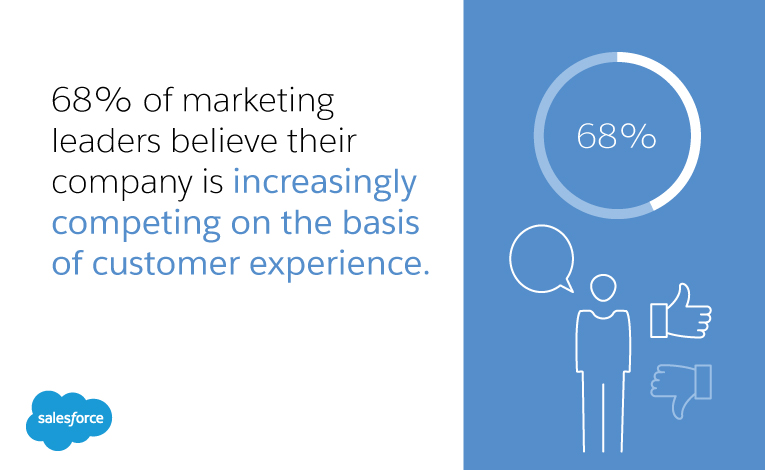business-to-business marketing
Using CRM to Optimise Business-to-Business Marketing

At its most basic, marketing is the business of promoting products with the goal of selling them. It’s a fairly simple concept. Of course, in order to do this effectively, businesses need to understand more than the products and services being offered — they need to understand their buyers. Marketing, after all, is about reaching people, and that means building relationships.
According to the most recent Salesforce “State of Marketing” report, 68% of marketing leaders believe their company is increasingly competing on the basis of customer experience. Most B2C marketers understand this well, and work hard to factor client relationship management into their marketing strategies. However, many B2B marketers have yet to fully recognise the significance of interpersonal connections. This is largely because, while B2C and B2B marketing share a number of characteristics, there are still some key differences.

What separates B2B from B2C?
Business-to-business marketing is exactly what it says on the label: marketing to an organisation, rather than to an individual customer. And while the actual sales themselves are still conducted person-to-person, this distinction is significant enough to create a real division between the two types of marketing.
For one thing, B2B marketing generally deals with much larger sums of money. There are also normally more decision makers involved in the process. As B2B purchases impact entire organisations, there is much more oversight involved in decision- making. The end result is a longer, slower customer journey, focused on investment returns rather than exclusively on the advantages being offered.
B2B marketers also need to be much more familiar with the specific industries they are selling to. This includes learning the terminology and lingo associated with that industry, or even with a specific company. B2C clients enjoy marketing that is accessible, while B2B clients demand marketing content that is detailed and knowledgeable — not created with the layperson in mind. This means that B2B marketers tend to be more heavily involved in the research aspects of marketing, focusing chiefly on data and analysis.
With so much attention aimed at details and logic, is there still a place for interpersonal connection in an effective business-to-business marketing strategy? The answer is a resounding yes.
Customer relationships are built on data.
When all is said and done, it is still relationships that drive B2B sales. The difference is that they are relationships built more on data than on emotion. B2B may be very different from B2C, but in the end, they all come down to how well marketers understand their buyers and their buyers’ needs. And just as customer relationship management (CRM) is essential to creating a personalised, one-to-one journey for individual B2C clients, it provides a number of advantages for B2B marketers as well.
Much of this is dependant on the availability and reliability of customer data.
Superior CRM systems are designed to not only help marketers better understand their customers, but to better identify and define them as well. For B2B marketers, this is directly applicable, with 60% of B2B marketers saying that they are currently focusing more on improving personas and audience segmentation. Additionally, the most successful B2B marketing teams are nearly three -times more likely than underperformers to make extensive use of data targeting and segmentation.
CRM also benefits business-to-business marketing efforts by opening up marketing channels most commonly associated with B2C — namely social media and mobile. B2B mobile advertising has seen a 161% increase in the past two years, and video advertising, such as across social media feeds, has likewise seen 141% growth among B2B marketers. More available marketing channels means better access to client information, more accurate personas, and better targeted B2B marketing efforts.

CRM helps B2B data define the journey.
That said, understanding customers is only the first step. Once buyer personas have been established, the next objectives should be demonstrating value, building working relationships, and placing the B2B clients on the path to finalising sales.
Here, as with other marketing aspects, CRMs are uniquely useful. A superior CRM gives marketers the insights they need to identify client pain points, and the data they need to showcase what kind of investment return the clients can expect. Of course, CRM cannot do this alone. What it can do is facilitate better communication between marketers and clients, as well as other departments in-house (sales and support, to name a few). Working together through CRM-enhanced communication, and having easy access to all relevant data in a single location, makes it much easier for marketers to establish fact-based proof of value.
CRM tools also help keep everyone involved on course and aware of next steps. Marketing teams will know when and how they should be helping their clients move forward, and customers will know where they stand with the business itself. All of this is handled on a client-by-client basis, meaning that even the largest B2B customers receive a marketing experience tailored to their specific needs.
Of course, using CRM to craft a collaborative B2B marketing strategy depends heavily on the CRM itself, as well as the tools and capabilities it offers. For unparalleled B2B marketing effectiveness, consider Salesforce Pardot.
Pardot is B2B marketing made smarter.
Salesforce Pardot brings B2B marketers and clients together like no other CRM option. This is because Pardot is designed specifically for B2B marketing.
Guided by Salesforce Einstein AI, Pardot uses automation to easily track campaign performance in real time, identifying what’s working and what isn’t, to figure out where improvements can be made. Bringing all of the relevant data together in a single dashboard, sales and marketing teams can perfectly utilise a central collaboration hub to develop an in-depth familiarity with the organisations they’re marketing to.
Pardot also ensures that the sometimes -slow B2B process moves as quickly as possible. As prospects engage and interact, teams receive automatic notifications, giving them a jumpstart on addressing issues that could create clogs in the marketing pipeline. At the same time, new leads are constantly located and vetted, ensuring a constant influx of reliable prospects.
Marketing and sales teams can enjoy a complete, unified view of every prospect’s progress, while also taking advantage of automatic prospect analysis, so that they can better allocate their efforts to the most valuable leads. Reaching leads where they are and connecting with decision makers in every department with built-in social media options and email tools is another Pardot advantage.
As for those leads themselves, they get to experience a fully personalised B2B journey. Drag-and-drop landing page builders ensure that prospects are seeing the data they need, and customisable forms ensure that the right client data is being collected, with a minimum of client time being wasted. A focus on data coupled with a detailed understanding of client needs makes Salesforce Pardot the marketing option that B2B leads can trust.
When it all comes down to it, marketing is about more than just promoting products; it’s about helping individuals find solutions — whether that means individual customers; or individual companies. B2B marketing offers different challenges than traditional B2C, but with the right CRM solution, those challenges become as easy as clicking a button.



